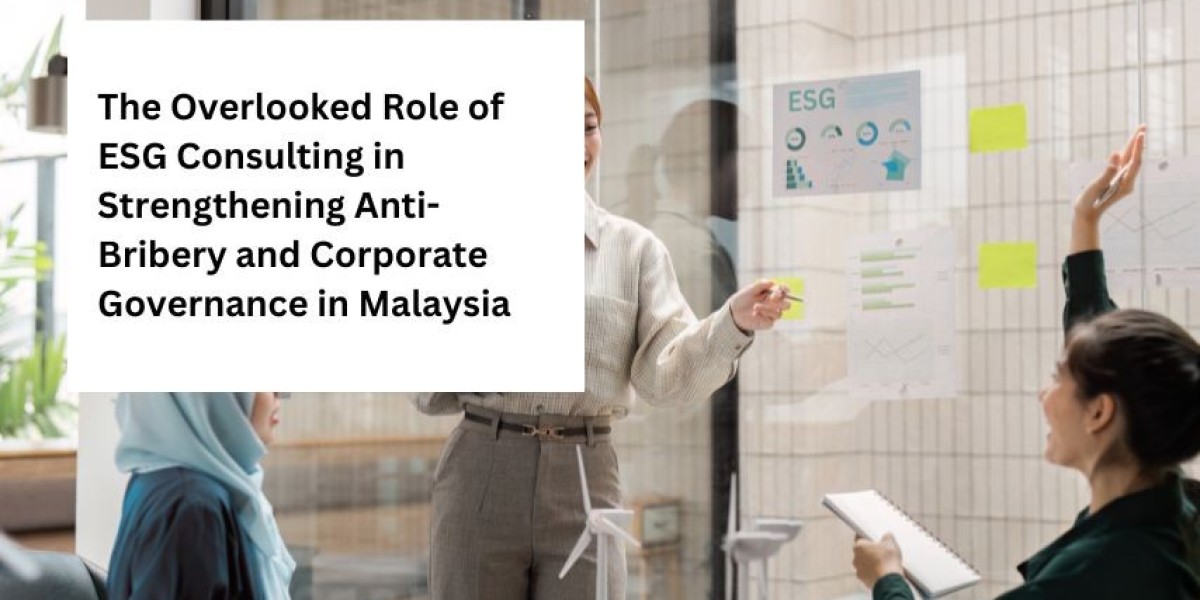A company's value is no longer measured solely by its balance sheet. Investors, regulators, and the public increasingly judge businesses on their commitment to ethical practices, environmental responsibility, and social impact. This shift has propelled Environmental, Social, and Governance (ESG) principles from the fringes of corporate social responsibility to the core of strategic planning. In Malaysia, where corporate governance and anti-bribery efforts are under a constant spotlight, the role of ESG is more critical than ever. However, its direct impact on strengthening integrity is often overlooked. ESG consulting offers a powerful, structured framework to not just improve sustainability metrics but to fundamentally enhance corporate governance and combat corruption from the inside out.
This article explores the crucial, yet underappreciated, link between ESG principles and robust anti-bribery and corporate governance (ABAC) measures in Malaysia. We will examine the current landscape, dissect how ESG consulting provides a roadmap for improvement, and offer actionable steps for companies ready to build a more resilient and ethical foundation. The ultimate takeaway is clear: embracing ESG is not just about compliance or public relations; it's about building a sustainable, trustworthy, and profitable business for the long term.
The State of Corporate Governance and Bribery in Malaysia
Malaysia has made significant strides in its fight against corruption and its efforts to improve corporate governance. Landmark legislation, most notably Section 17A of the Malaysian Anti-Corruption Commission (MACC) Act 2009, introduced corporate liability for bribery. This provision means a commercial organization can be held responsible if an associated person offers a bribe to obtain or retain business. The only defense is to prove that the organization had "Adequate Procedures" in place to prevent such conduct.
Despite these legal advancements, challenges persist. Malaysia's ranking in the Transparency International Corruption Perceptions Index has fluctuated, indicating an ongoing struggle. High-profile cases continue to surface, reminding the business community that legal frameworks alone are not enough. Weak internal controls, a lack of transparency, and a corporate culture that may implicitly tolerate unethical shortcuts create fertile ground for misconduct.
This is where the "Governance" pillar of ESG becomes paramount. Good governance is the bedrock of a healthy corporation. It encompasses everything from board oversight and executive compensation to shareholder rights and, critically, anti-bribery and corruption policies. When governance is weak, the entire ESG structure is compromised. A company can have excellent environmental policies, but if its leadership is embroiled in a bribery scandal, its reputation and stakeholder trust will collapse.
ESG as a Framework for Stronger Governance
ESG provides a holistic lens through which to view corporate risk and opportunity. While the "E" (Environmental) and "S" (Social) components often receive more public attention, the "G" (Governance) is the engine that drives sustainable and ethical operations. It is the framework that ensures accountability, transparency, and integrity.
The Interconnectedness of E, S, and G
The three pillars of ESG are not independent silos; they are deeply interconnected. A failure in governance can lead to significant environmental and social damage.
- Environmental Impact: A company might cut corners on environmental regulations by bribing officials to look the other way, leading to pollution or illegal deforestation. Strong governance, with transparent reporting and robust internal audits, makes such actions much harder to hide.
- Social Consequences: Corruption can lead to the exploitation of labor, unsafe working conditions, and the neglect of community rights. For instance, a construction company might use substandard materials after bribing an inspector, endangering public safety. A strong social component, guided by ethical governance, prioritizes human rights and community well-being in the supply chain.
By focusing on strengthening the "G," companies inherently bolster their "E" and "S" performance. An ethical leadership team, an engaged board, and transparent processes create a culture where cutting corners is not an option.
How ESG Strengthens Anti-Bribery Measures
ESG principles directly reinforce the "Adequate Procedures" outlined in guidelines like those from Malaysia's PRIME Minister's Department. These procedures, known by the acronym T.R.U.S.T., are:
- Top-Level Commitment
- Risk Assessment
- Undertake Control Measures
- Systematic Review, Monitoring, and Enforcement
- Training and Communication
ESG consulting helps operationalize this framework. An ESG-focused approach goes beyond a simple legal check-the-box exercise and embeds these principles into the corporate DNA. For example, a commitment to supply chain transparency (an 'S' and 'G' issue) naturally requires a deeper dive into the ethics of third-party vendors, directly supporting anti-bribery risk assessments.
The Role of the ESG Consultant: From Theory to Action
Understanding the importance of ESG is one thing; implementing it effectively is another. This is where specialized ESG consulting firms like Wellkinetics become invaluable partners. They act as catalysts, guiding companies through the complex process of integrating ESG principles into their core strategy and operations, with a direct positive impact on governance and anti-bribery controls.
1. Conducting Materiality and Risk Assessments
The first step an ESG consultant often takes is to conduct a materiality assessment. This process identifies the specific ESG issues that are most critical to the company and its stakeholders. For a Malaysian company in the infrastructure sector, for example, bribery and corruption risks associated with public tenders would likely be a high-priority material issue.
The consultant helps the company:
- Identify High-Risk Areas: Pinpoint specific business activities, geographical locations, and third-party relationships that pose the greatest risk for bribery and corruption.
- Quantify Risks: Evaluate the potential financial, reputational, and legal impact of these risks.
- Align with Stakeholder Expectations: Understand what investors, regulators, and customers expect in terms of anti-bribery commitments.
This process provides the data-driven foundation needed to develop a targeted and effective ABAC program, ensuring resources are focused where they are needed most.
2. Developing and Implementing Robust Governance Structures
Once risks are identified, ESG consultants work with leadership to build the necessary structures to mitigate them. This goes far beyond simply writing a policy document.
- Board-Level Oversight: Consultants help establish or strengthen board committees responsible for ethics, compliance, and ESG. They provide training to board members on their fiduciary duties related to anti-bribery and help define clear roles and responsibilities.
- Designing Internal Controls: They assist in designing practical internal controls, such as clear policies on gifts and hospitality, due diligence procedures for third parties, and transparent procurement processes. This directly addresses the "Undertake Control Measures" principle of T.R.U.S.T.
- Enhancing Transparency and Reporting: A key tenet of ESG is transparency. Consultants help companies develop comprehensive sustainability reports that include detailed disclosures on governance practices, anti-corruption policies, and any incidents that have occurred. This public accountability creates a powerful incentive to maintain high ethical standards.
3. Fostering a Culture of Integrity through Training
A policy is only as good as its implementation. ESG consultants are instrumental in developing and delivering training programs that transform anti-bribery policies from paper documents into lived realities for every employee.
Effective ESG-driven training is:
- Tailored: It is customized to different roles within the company. Training for the sales team, who may face direct requests for facilitation payments, will differ from training for the finance department, which needs to spot red flags in invoices.
- Engaging: Instead of dry legal recitations, training uses real-world case studies and interactive scenarios to make the concepts relatable.
- Continuous: It is not a one-time event but part of an ongoing communication strategy that reinforces the company's top-level commitment to integrity.
This focus on culture-building is a core contribution of ESG consulting. It shifts the mindset from "avoiding punishment" to "doing the right thing" because it aligns with the company's stated values.
4. Systemizing Monitoring, Auditing, and Reporting
ESG demands data. You cannot manage what you do not measure. Consultants help companies establish systems to systematically monitor the effectiveness of their ABAC programs.
This includes:
- Key Performance Indicators (KPIs): Developing KPIs to track progress, such as the percentage of employees trained, the number of third parties who have undergone due diligence, and the time taken to investigate whistleblower reports.
- Internal Audits: Designing and conducting periodic audits to test the effectiveness of internal controls and identify weaknesses before they can be exploited.
- Whistleblowing Mechanisms: Helping to implement secure, confidential, and accessible whistleblowing channels, and ensuring procedures are in place to investigate reports impartially and protect whistleblowers from retaliation.
This systematic approach provides the board and senior management with the assurance that their anti-bribery program is not just designed well but is also working effectively in practice. This directly fulfills the "Systematic Review, Monitoring, and Enforcement" element of the Adequate Procedures.
Actionable Recommendations for Malaysian Companies
For Malaysian businesses looking to leverage ESG for better governance, the path forward is clear. It requires a strategic commitment from the top and a willingness to invest in building a resilient, ethical foundation.
1. Conduct a Governance-Focused ESG Assessment: Don't treat ESG as a sustainability-only initiative. Start by commissioning a materiality assessment with a specific focus on identifying governance and anti-bribery risks. Understand where your vulnerabilities lie from an ESG perspective.
2. Empower Your Board: Ensure your board has the necessary expertise in ESG and anti-corruption matters. Consider appointing a director with a strong background in this area or establishing a dedicated board committee for ESG and ethics oversight. Provide them with regular, detailed reports on the performance of the ABAC program.
3. Invest in Specialized ESG Consulting: Engage a reputable ESG consulting firm with proven expertise in governance and anti-bribery. Look for a partner who can provide a holistic service, from risk assessment and policy design to training and monitoring. View this not as a cost, but as an investment in long-term resilience and value creation.
4. Integrate, Don't Isolate: Weave your ABAC program into your broader ESG strategy. Link your anti-corruption KPIs to your overall sustainability goals. When reporting on ESG, provide transparent and detailed disclosures about your governance framework, anti-bribery controls, and performance.
5. Leverage Technology: Use technology to enhance your ABAC program. Implement digital platforms for third-party due diligence, e-learning modules for training, and sophisticated data analytics to detect red flags in financial transactions. ESG consultants can help identify and implement the right technology solutions for your needs.
Conclusion
In Malaysia and across the globe, the connection between good governance and business success has never been stronger. The introduction of corporate liability for bribery has raised the stakes, making robust anti-corruption measures a non-negotiable aspect of risk management. However, a compliance-only approach is not enough. It is the integration of these measures into a broader, purpose-driven ESG strategy that truly builds corporate resilience.
ESG consulting provides the expertise, framework, and objective viewpoint necessary to bridge the gap between intention and action. By helping companies identify risks, build strong governance structures, foster a culture of integrity, and transparently report on their progress, consultants play an overlooked but pivotal role. They help transform anti-bribery programs from a legal necessity into a source of competitive advantage. For Malaysian companies, embracing ESG as a tool to strengthen corporate governance is not just about mitigating risk; it is about building a foundation of trust with investors, employees, customers, and society at large—a foundation essential for sustainable growth in the 21st century.







